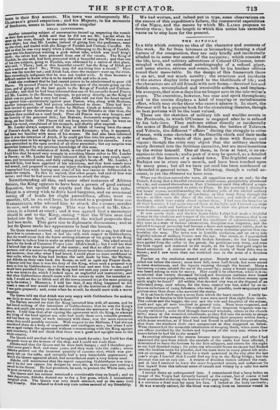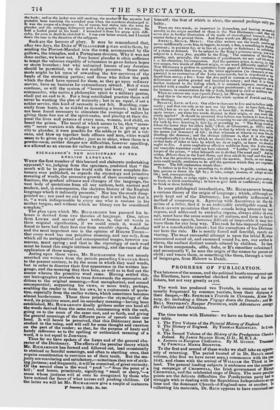?HE BIVOUAC
Is a title which conveys no idea of the character and contents of this work. So far from bivouacs or bivouacking forming a chief feature of the composition, they are only briefly and incidentally alluded to in some war scenes of the narrative ; which consists of the life, love, and military adventures of Colonel O'Connor, inter.. mingled with an episodical autobiography of a refined gipsy, and some stories, serious and comic, told by his brother officers round their mess-table. In the design of this framework there is no art, and not rcuch novelty ; the structure and incidents of the stories display little regard to the likelihoods of life; and the characters are all old friends with new forms.—deceived fair and foolish ones, accomplished and irresistible seduces, and implaca- ble avengers, that now-a-days live no longer save in the tale-writer's pages. The execution, however, has ease and spirit throughout; and in the stories displays a kind of traim'ap or melodramatic effect, which may strike those who cannct admire it. In short, the Bivouac will be a popular book for the circulating libraries, though its best portions will be the least valued. These are the sketches of military life and warlike events in the Peninsula, in which O'Connor is engaged after lie is refused by his lady-love. They embrace either directly or incidentally the seizes of Badajoz and St. Sebastian, the battles of Talavera and Vittoria, the different " affairs " during the struggle to enter France, with some sketches of the Guerilla chiefs and their mode of warfare. The whole of this part is done with fluency and vigour; though the critic may object that the military sketches rarely dovetail into the fictitious narrative, but are mere insertions by the writer himself. One of these, in form at least, is an ex- ception to this remark; and a part of it may be quoted, as a detailed picture of the horrors of a sacked town. The frightful scenes of Badajoz are in every one's mouth, and have been touched upon by many pens; but all we have yet read has been condensed or shrouded in general terms. The following, though a veiled ac- count, is yet the thinnest we have seen.
When our division entered the town, all opposition was at an end ; for tbe French, felting that a dreadful retaliation would ensue, precipitately abandoned the city, and secured themselves in Fort Christoval until they effected a capi. tulation, and were permitted to retire to Elvis'. In the morning I obtained a few hours' repose, notwithstanding the deafening ,s ells of the excited soldiery and their incessant discharge of iiiii•keti y, mis tiny went firii,g through the St rem t,, or blew open the doors of the oine home., and indeed of all other dwellings, which it ire vainly chord against them. 1 bad se1.11 the breaAes iii all their !imams ; I hail again ermsed thrill in (la!, light, and I turned my steps towatils the ca,tle and Iustion of San Vnicent, to view the places where icy more fin tonate comrades haul forced their way. It was neatly dusk, and the few hours Mille I slept hal made is fri4litful change in the condo mu and temper of the soldiery. In the mornilig they were obedient to their officer., and preserved the semblance of subordination ; umw they were in a state of furious intoxication, discipline was forgotten, and the splend d troops of yesterday had become a fierce and sanguinary rabble, dead to every touch of human feeling and tilled with every demoniac passion that can brutalize the man. The town was in horrible confusion, and on ev,ty side ft ightful tokens of military hymns: met the eye. One street, as I approached the castle, was almost choked up with broken furniture ; for the houses had been gutted from the cellar to the garret, the partitions turn down, and eves the beds ripped and scattered to the winds, in the hope that gold might be found concealed. A convent at the end of the stiada of Saint John was in flames ; and I saw more than one wretched nun in the arms of a drunken
soldier.
Further on the confusion seemed greater. Brandy and wine.easks were rolled out before the stores; sonic were full, some half drunk, but more staved in tnere wantonness, and the liquots running through the kennel. Many • harrowing scream saluted the ear uf the parser-by; many a female supplication was heard asking in vain for mercy. How could it be otherwise, when it is re- membered that twenty thousand furious and licentious mailmen were loosed upon an immense population, among which many of the loveliest women upon earth might be found ? All within that devoted city was at the disposal of an infuriated army, over whom, for the time, control was lost, aided by an in- famous collection of camp followers, who were, if possible, more sanguinary and pitiless even than those e. ho survived the storm. it is modes* to dwell upon a scene from which the heart revolts. I verily be. lieve that few females in this beautiful town were saved that night from insult. The noblest and the beggar, the nun and the wife and daughter of the artisan, youth and age, all were involved in general ruin. None were respected, and few consequently escaped. The madness of those desperate brigands was va- riously exhibited ; some fired through doors and windows, others at the church bells; many at the wretched inhabitant., as they fled into the streets to escape the bayonets of the savages who were demolishing their property within doors; while some wretches, as if blood hail not flowed in sufficient torrents already. shot from the windows their own companions as they staggered on below. What chances had the miserable inhabitants of escaping death, when more than one officer perished by the bullets and bayonets of the very men whom • few hours before he had led to the assault?
As evening advanced the attests became more dangerous ; and after I had examined the spot from which the escalade of the castle had been effected, I
determined to leave the fortress by the first sallyport, and return for the night
to our halfdeserted camp ; for every one who could frame an excuse had flocked into the luckless town fur plunder, and the tents were in many places left with- out an occupant. Having been for a week quartered in the city alter the last year's siege, I fancied .that I could find my way to the flying bridge; but the attempt was not an easy one. A swarm of drunken rioters infested the road; and at last I resolved to leave the more frequented streets, and endeavour :to free myself from this infernal scene of tumult and viiiany by a safer but mere devious path. I turned down an unfrequented lane. I remembered that a lamp before an image of the Virgin had formerly burned at the corner, hut of course it had been unattended to during the horrors of tbe past night. Not fifty poem from t le entrance a dead man lay upon his fact. I looked at the body carelessly ; ife visa scarcely extinct, for the blood was °ming from an immense waited la the bark; and as the jacket was still smoking, the mrisket?ff he assassin had probably been touching the wretched man when the murderer discharged it. It was the corpse of a dragoon : he, of course, had stolen into the town for plunder, and the unhappy delinquent paid a deep penalty for his crime. He held a loaded pistol in his hand : I wrenched it from his grasp with diffi. culty, for even in death he clutched it. I was now better armed, and I hurried down the lane in the direction of the sallyport.
Such are the horrors of glory. It may be remembered that, after two days, the Duke of WELLINGTON pat an end to them, by sending the Provost-Marshal into the town, accompanied by the gallows, the triangles, and a Portuguese division. Why it was not done earlier, we know not. Four hours' plunder is often sufficient to tempt the valorous cupidity of volunteers to goon forlorn hopes or storm breaches ; but why unlimited licence of any duration should be permitted, we do not readily perceive. Some other mode might be hit upon' of rewarding the few survivors of the beads of the storming parties; and those who follow the path which the dead have opened for them, as they go upon ordinary service, have no business for extraordinary reward. But if wars continue, so will the system of "beauty and booty," until some commander, who unites a philosophic spirit to a military genius, shall put an end to it. For a long established practice there will never be wanting the plea of necessity ; but in an equal, if not a nobler service, this kind of necessity is not felt. Boarding, espe- cially from boats, is as riskful as mounting a breach ; but it has not been found necessary to stimulate the courage of sailors by giving them free use of the spirit-casks, and placing at their dis- posal the lives and persons of every man, woman, and child, on board the prizes. The moral of which seems to be, that " neces- sity " never coexists with danger to power. If, in giving up a city to plunder, it were possible for the soldiery to get at a vol- cano, and blow up together both officers and men, cities would cease to be given up to plunder ; just as in ships, when there is a powder-room, neither danger nor difficulties, however appulling, are allowed as an excuse for sailors to get drunk or run riot.



























 Previous page
Previous page